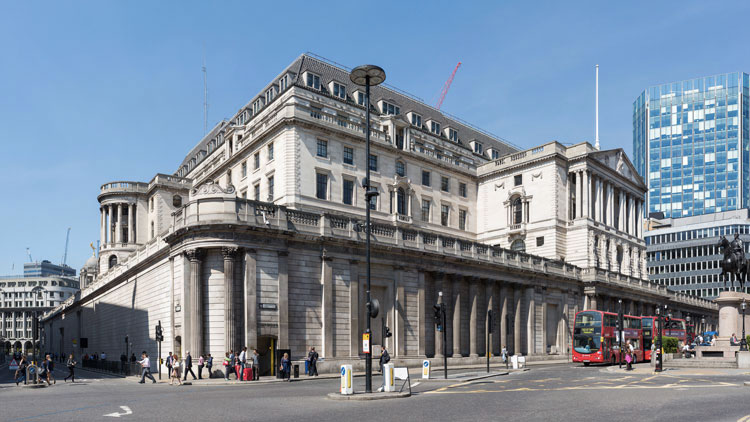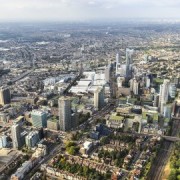
The Bank of England. Pic: Wikipedia Commons
Lewisham residents could be among those affected by the recent rise in interest rates, where median household incomes are 15 per cent below the London average.
The Bank of England increased the official bank rate on Thursday (November 2) from 0.25 per cent to 0.5 per cent, the first increase in 10 years.
The increase comes as levels of unemployment are at a record low of 4.3 per cent and inflation has risen to 2.9 and the global economy is stronger.
Mark Carney, Governor of the Bank of England, told the BBC that the rate is likely to increase again over the next two to three years, but mortgages and savings would not be immediately affected.
But potential losers could be residents in rented accommodation, depending on what kind of mortgage their landlord has.
Homeowners on variable rate or tracker mortgages could see their repayments increase, which could potentially affect renters.
A rise in interest could mean that landlords on either of these mortgages could see their repayments increase – but it is up to them whether they inflict these costs onto their tenants.
There are approximately 116,000 households in Lewisham, and just over a quarter of those are privately rented.
Councillor Joe Dromey, Cabinet Member for Policy and Performance and Chair of the Lewisham Poverty Commission told EastLondonLines: “The cost of housing is one of the clear drivers of poverty in Lewisham, and increasingly in the private rented sector. Anything that drives up rents could have a significant impact on poverty.”
“The higher interest rate could affect the owners of properties as they may face higher mortgage costs, and that may then be passed on to private renters.”
With prices already at an all-time high, it could mean uncertainty for some residents in rented accommodation.
Robin Hunter, 23, who rents a flat in Telegraph Hill, feels that the interest rate will affect the younger generations. The creative technologist told ELL: “If rent prices go up then it will of course impact young people – we can add it to the list of financial disasters we’ve been handed.
“Buying in my area is a pretty brilliant idea but I don’t have the capital, and realistically by the time I do have enough to put down a deposit, I’m worried that the prices will inflate so much that’ll be impossible.”
As Dromey said, housing costs have a considerable effect on the levels of poverty in Lewisham, as reported by ELL in October.
As it stands, private rents in the borough are rising faster than any other area in London. According to a report by the Lewisham Poverty Commission, between 2011 and 2016, they increased by 40 per cent. The average income in Lewisham is £620.80 per week, and many households are paying more than half their wages on rent – with barely any room to accommodate their living costs.
His fears were seconded by Ray Barron-Woolford, a member of campaign group Lewisham People Before Profit. He told ELL: “The rise of rents creates a situation in which living in London is nothing but a pipe dream for many…without even basic rent control, the average London wage will hardly cover the rent for a two-bedroom flat.”
Although the change may not immediately affect mortgages, credit cards, loans and savings, it could have a significant impact on people already on low incomes.
Reducing interest rates means that people are less likely to save money and borrow more, which increases spending levels.
Even though the rise could affect some residents, it may be some time before it impacts their monetary decisions, and won’t affect consumer prices immediately.
Whilst this is the first raise in a decade, it is at a considerably low level compared to figures in the 1970s. There have been times in the past where the rate has risen well above 10 per cent – peaking at 17 per cent in 1979 when the then Prime Minister Margaret Thatcher tried to combat inflation rates.
The increase in interest rates is decided by the Monetary Policy Committee (MPC) at the Bank of England. Their official interest rate, also known as the Bank Rate, increases and decreases according to how the Bank needs to influence the level of activity in the economy.
The Bank of England Act 1998 stated that the Bank is independent to set interest rates, and is under a mandate from the government to keep inflation to their targets. The inflation target is announced each year in the Chancellor of the Exchequer’s Budget statement. The Bank is accountable to both Parliament and the British public to achieve economic stability.
The MPC set their policies to meet the current target of 2 per cent inflation, taking into account what will help sustain growth and employment.
Currently inflation levels are at 3 per cent, which is the country’s highest rate since April 2012 – hence the decision of the MPC to increase interest rate to bring this down.
The UK’s decision to leave the European Union has had a considerable impact on the movement of the rate. Following a cut in interest rate in August 2016, shortly after the EU Referendum, the increase has been impacted by consumer uncertainties – even as the global economy improves, domestic activities in Britain slow down as it anticipates a new arrangement with the European Union.




